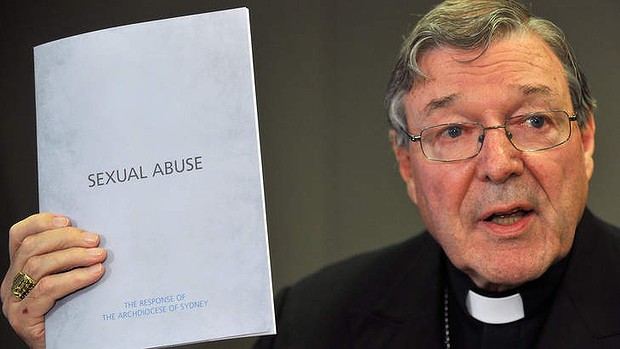Chronicle of Haunted Dreams
By Gerard Windsor
George Pell refused to speak with David Marr for this Quarterly Essay. It was not a wise move. If you have any attractive elements in your personality, and many testify that Pell does have them, an intimate conversation with an enemy can only have a softening impact. Witness Marr's surprising empathy with Tony Abbott in his last Quarterly Essay. Abbott had been ready to chat. There is no doubt that Marr sees Pell as an enemy. His 2000 book, The High Price of Heaven, made clear his antipathy to religion, above all in the form of the Catholic Church. Here Marr's colours are nailed to the mast even in the miniature on the cover: Pell, prince of the church, enthroned, bathed in Renaissance gold - never a benign look for a prelate. But Marr is also a professional. In this instance, he's the professional lawyer as much as the journalist. The essay must be something of a dry run for the Royal Commission, and it makes very painful reading. Evil men and their orgies of destruction of young lives occupy much of its space, and it is more a forensic piling-up of evidence than any artistically choreographed revelation. Centrally, it's an indictment of Pell for blind, evasive, flint-hearted reactions to reports of paedophilia by priests who were his responsibility. For good measure, there is also a ready summary of the case brought against Pell by two former altar boys turned criminals, a case where the outcome was a technical draw. Has a more devastating portrait of a ''respectable'', living, non-politician, Australian public figure ever been published? Although Marr concentrates on Pell's role in the abuse scandal, the most novel element of The Prince is a probing of the personality that began life in a pub in Ballarat. There is limited discussion of the cardinal's more general ecclesiastical activities, but some of Marr's saddest judgments are on the man in those roles. ''Reading Pell's sermons and newspaper columns, I was struck by how little they reveal of the man. Despite flashes here and there, his words are so shallow, so impersonal. Spiritual insight is sparse … when he speaks there is so little there.'' Marr listens to him preach, ''but he just rambles''. Yes, one of the anomalies about Pell, such a hardliner, is that when he speaks, he sounds so devoid of passion and conviction and personally gathered insight. In the rallentando of Marr's last page, when he unleashes his spontaneous self, he refers to Pell's ''strange ordinariness''. ''No sex,'' he claims, is Pell's obsession. ''A robust schoolboy decided … to kill sex in himself. The gamble such men take is that they may live their whole lives without learning the workings of an adult heart. Their world is the church. People are shadowy. Pell is one of these: a company man of uncertain empathy. He has the consolations of friendship, music and a good cellar. And he has what inspired him from the start: a place in the highest levels of his church and a voice in the nation. He has power.'' Some of this must be speculative, but the subject hasn't helped. Marr has not seen any best foot put forward, and his celebrated caustic wit can't restrain itself. ''John Paul had his faults. One was a weakness for flattery. Pell's flattery of the man was brazen.'' So much for the saint-to-be. ''Pell's parish was the big end of town … He exercised his own [power] with a freedom unimaginable to a politician. He didn't need to win hearts or votes.'' Marr says Pell's supreme good is his church, the hierarchical church, not the community of believers and, in the Marr telling, Jesus Christ does not make an appearance. It's a grim time for Pell. He has his loyal Praetorian guard, but the Royal Commission must haunt his dreams. Now - fearful irony - he's having to cope with Francis, a pope he certainly didn't want, a Jesuit, an order he is not partial to, and whose increasingly liberal statements he is furiously having to recast for local consumption, or at least for readers of The Catholic Weekly. It's hard not to feel for someone in such straits, but the old remedies of hardball lawyers and creative spin doctors are no longer the solution. Gerard Windsor's forthcoming book is Angels Before Me: The Road to Santiago.
|
.
Any original material on these pages is copyright © BishopAccountability.org 2004. Reproduce freely with attribution.
